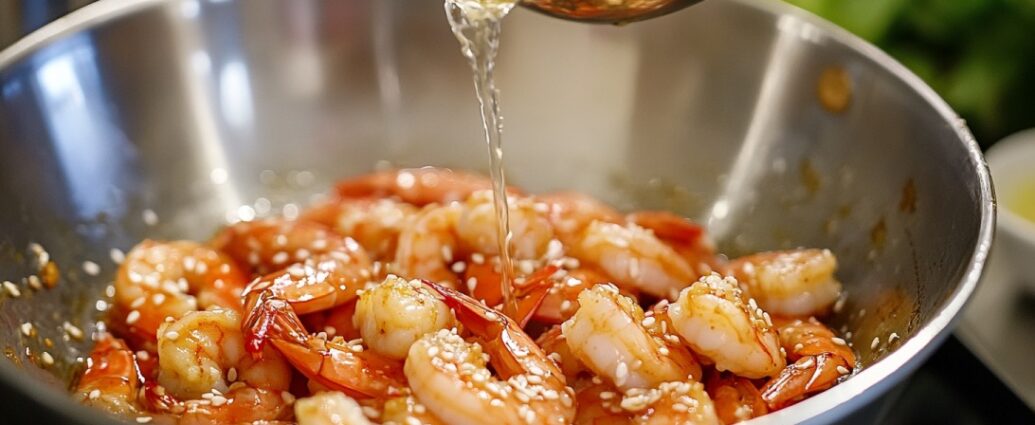Asian-inspired marinades bring bold flavors and quick preparation to seafood dishes.
Ingredients like ginger, garlic, soy, sesame, and citrus create dynamic combinations.
Ideal for grilling, sautéing, or roasting, they deliver weeknight meals with big taste in minimal time.
Core Elements of an Asian Marinade
Crafting a flavorful Asian marinade begins with a strong aromatic base. Fresh ginger and garlic awaken the palate, providing warmth and pungency that are essential for depth. Green onions or scallions add brightness and freshness, offering a light herbal lift that balances stronger flavors.
To create a foundation of complexity, umami builders are essential. These ingredients provide the savory depth that defines many Asian cuisines. Soy sauce, known for its salty and earthy depth, brings out seafood’s natural savoriness.
Tamari can be used as a gluten-free alternative without sacrificing depth. Fish sauce and oyster sauce introduce bold, fermented notes that amplify other ingredients.
- Soy sauce (salty and slightly sweet)
- Tamari (gluten-free, similar flavor)
- Fish sauce (fermented, intensely savory)
- Oyster sauce (thick, mildly sweet and rich)

Balancing acidity and sweetness is just as important. Without acid, marinades taste flat. Without sweetness, they lack smoothness. Lime juice and orange juice both offer bright acidity with a fruity edge. Honey adds smooth sweetness, while sweet chili sauce introduces both sugar and spice.
- Lime juice (sharp citrus)
- Orange juice (mild and sweet)
- Honey (smooth, natural sugar)
- Sweet chili sauce (sweet with mild heat)
Adding spice gives marinades their dimension. Spicy elements energize the flavor profile without overpowering the dish. Gochujang adds fermented depth with heat. Chili-garlic paste gives a more immediate and pungent kick. Sriracha provides a recognizable warmth with just enough burn.
Sesame Ginger Shrimp Marinade

Fresh lime juice combines with sesame oil and honey for a mixture that balances brightness and sweetness. Gochujang injects heat and fermented tang. Dijon mustard adds sharpness, while fish sauce rounds everything out with a deep, savory kick.
No element dominates, allowing each to support the overall flavor profile.
- Lime juice
- Sesame oil
- Honey
- Gochujang
- Dijon mustard
- Fish sauce
Ideal for shrimp, tofu, or chicken, this marinade adapts to various proteins. Shrimp absorbs the liquid quickly, requiring only a short marination period. Tofu soaks it in generously, bringing the sauce’s intensity forward. Chicken benefits from the punchy notes, developing a flavorful crust when roasted or grilled.
- Shrimp skewers (grilled or roasted)
- Cubed tofu (pan-fried or baked)
- Chicken thighs or breasts (roasted or grilled)
Cooking methods offer flexibility. Grilling imparts smoke and char. Roasting creates rich caramelization. Pan-searing locks in flavor quickly with a golden finish. Each approach enhances the marinade differently.
Important marination tip: Keep the seafood marinating time to 30–60 minutes. Anything longer may lead to a rubbery texture due to the acidic lime juice. Quick exposure brings out full flavor without affecting texture.
Orange-Soy Seafood Marinade

Orange juice plays a lead role by introducing fruity sweetness and gentle acidity. Soy sauce anchors the profile with depth. Grated ginger provides zing, while scallions brighten the blend. Sesame oil brings the composition together with warmth and aroma.
- Orange juice
- Soy sauce
- Grated ginger
- Scallions
- Sesame oil
Perfect for tuna, catfish, white fish, and shrimp, this marinade works across a range of textures. Each type of fish benefits differently—tuna gains sweetness and contrast, catfish absorbs the ginger, and white fish retains its light character while being enhanced.
Pro tip: Reserve a small portion of the marinade before combining with raw seafood. Reduce it in a saucepan to create a glaze. Drizzle over steamed rice or vegetables to bring the whole dish together.
- Glazed tuna steak with rice
- Pan-seared catfish with steamed bok choy
- Grilled white fish over jasmine rice
Marination time should range between 20–40 minutes. Longer for dense fish like tuna, shorter for delicate fillets. Pan-searing or broiling allows the sugars in the orange juice to caramelize, giving a golden sheen.
Garnish with chopped scallions or sesame seeds for added aroma and contrast.
Sweet Chili Scallop & Shrimp Marinade

Thai sweet chili sauce introduces both sugar and subtle heat. Soy sauce deepens the body of the marinade. Chili-garlic paste intensifies the spice, and ginger keeps things fresh and zingy. This blend is ideal for seafood needing minimal time and maximum flavor.
- Thai sweet chili sauce
- Soy sauce
- Chili-garlic paste
- Grated ginger
Scallops and shrimp absorb the marinade quickly. Pan-searing creates a golden crust, thanks to the sugar content. Searing also locks in juices and builds texture.
Serve with purple cabbage salad dressed in a ginger vinaigrette. The crunch of cabbage plays against the tenderness of seafood. Ginger in the dressing reflects the marinades, creating harmony across the plate.
- Pan-seared scallops with ginger cabbage slaw
- Shrimp over crispy noodles with extra sauce
Flavors hit in stages. Sweetness appears first. Soy follows with a salty edge. Chili and garlic round out the finish. Garlic stays present even after cooking, giving each bite a warm echo.
Keep marination time under 30 minutes. Acid and salt can easily over-soften shellfish. Fast marinating with hot sear brings out best results.
Versatility Across Proteins
Every featured marinade transitions easily across different proteins. Adjust marination time, acid concentration, and cooking methods to suit each ingredient’s structure.
Tofu benefits from long soaks. Press out water first, then let sit in the marinade for 45–60 minutes. Firm tofu works best with sesame-ginger or sweet chili blends, particularly when grilled or oven-baked.
- Use extra-firm tofu
- Press to remove moisture
- Marinate up to 1 hour
- Grill or roast for crisp edges
Chicken, especially thighs or breast strips, needs more time to absorb flavor. Marinate for 4–8 hours. Citrus and soy combinations work well, especially orange-soy with a touch of ginger. Roast or grill until caramelized.

- Marinate 4–8 hours
- Use orange-soy or sesame base
- Grill or bake to enhance surface flavor
White fish fillets call for a gentle hand. Acid can break down flesh quickly, so limit marinating to 15–25 minutes. Pan-searing or broiling ensures fast cooking with a beautiful finish.
- Marinate for under 30 minutes
- Avoid excess acid
- Cook quickly over high heat
Balance matters. Shorten acid exposure for delicate proteins. Increase marinating time and richness for thicker cuts. Tailoring the process to each protein brings out the best in both the marinades and the ingredients.
Summary
Asian-inspired marinades make seafood and other proteins bold and unforgettable.
Ginger, soy, citrus, and spice work fast and deliver depth.
Quick to prep and easy to cook, they transform simple ingredients into aromatic, satisfying meals.



